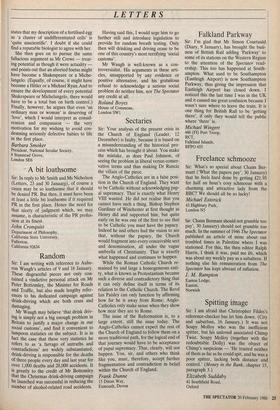Sectaries
Sir: Your analysis of the present crisis in the Church of England (Leader, 12 December) is faulty, because it is based on a misunderstanding of the historical pro- cess which has brought it about. You make the mistake, as does Paul Johnson, of seeing the problem in liberal versus conser- vative terms and thus making Dr Runcie the villain of the piece.
The Anglo-Catholics are in a false posi- tion in the Church of England. They want to be Catholic without acknowledging pap- al supremacy. That is exactly what Henry VIII wanted. He did not realise that you cannot have such a thing. Bishop Stephen Gardiner of Winchester at first thought as Henry did and supported him, but quite early on he was one of the first to see that to be Catholic you must have the papacy. Indeed he and others had the vision to see that, without the papacy, the Church would fragment into every conceivable sect and denomination, all under the vague umbrella of Christianity. That is exactly what happened and continues to happen.
While the Roman Catholic Church re- mained by and large a homogeneous enti- ty, what is known as Protestantism became such a diverse and contradictory thing that it can only define itself in terms of its relation to the Catholic Church. The Revd Ian Paisley can only function by affirming how far he is away from Rome; Anglo- Catholics only make sense when they show how near they are to Rome.
The issue of the Reformation is, to a large extent, still the issue today. The Anglo-Catholics cannot expect the rest of the Church of England to follow them on a more traditional path, for the logical end of that journey would have to be acceptance of papal supremacy. That, clearly, will not happen. You, sir, and others who think like you, must, therefore, accept further fragmentation and contradiction in belief within the Church of England.
Frank Dunne
15 Dinan Way, Exmouth, Devon


















































 Previous page
Previous page